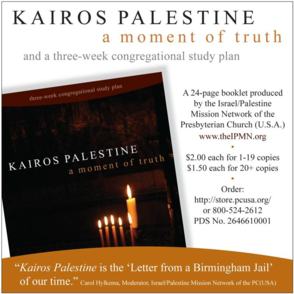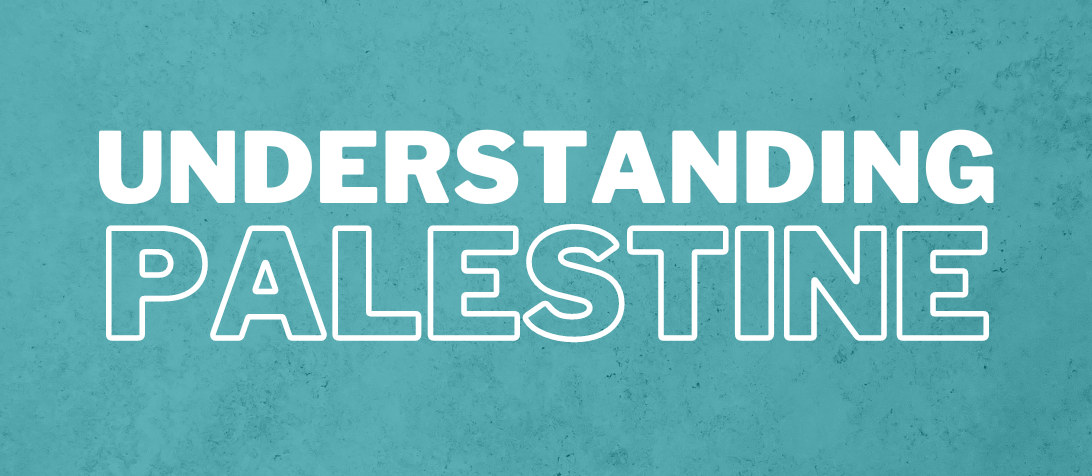 In addition to the materials on this page, we recommend looking at other curriculum in this section of the website (see the menu on the left). For instance, in High School & Elementary curricula, see a resource from United Church of Christ Palestine Israel Network (UCCPIN) that may have elements useful for adult study: Another Story Heard: A Bibliography of Resources about Palestinians for Children and Youth.
In addition to the materials on this page, we recommend looking at other curriculum in this section of the website (see the menu on the left). For instance, in High School & Elementary curricula, see a resource from United Church of Christ Palestine Israel Network (UCCPIN) that may have elements useful for adult study: Another Story Heard: A Bibliography of Resources about Palestinians for Children and Youth.
ON THIS PAGE:
Courses and Study Guides:
• Study Guide for the Kairos Palestine Document, from the PCUSA
• Call to Action: U.S. Response to the Kairos Palestine Document, from Kairos USA
• Steadfast Hope: The Palestinian Quest for Just Peace, from IPMN
• Zionism Unsettled: A Congregational Study Guide, from IPMN
• Why Palestine Matters: The Struggle to End Colonialism, from IPMN
• Understanding Palestine, from Makan
• Chosen? Reading the Bible Amid the Israeli-Palestinian Conflict, by Walter Brueggemann – includes Study Guide
• How Are the Children? Palestinian Children in Israeli Military Detention, from UCCPIN
• Facing the Nakba, from Jewish Voice for Peace
• Hope for the Holy Land: Understanding and Responding to the Israeli/Palestinian Conflict, from Friends of Sabeel-Colorado
•God’s People: Bible Studies Reflecting on the Holy Land, from the Methodist Church in Britain
• Study Guide for the book by Naim Ateek: A Palestinian Christian Guide for Reconciliation
Other resources that might be useful for group study and discussion:
• PromisedLandMuseum.org, a Jewish Perspective on the Palestinian Experience, from Coalition for Peace with Justice
• Promoting a Just Peace in Palestine-Israel: A Guide for UCC Faith Leaders, from UCCPIN
• Facts on the Ground, from Christian Aid
• One Land and Many Voices: Strands of Christian thought about who lives in the Holy Land, from Christian Aid
• MCC and Palestine and Israel, from the Mennonite Central Committee
Kairos Palestine Moment of Truth Study Guide
This special 24-page publication pairs the Kairos Palestine statement with a three-week study plan that provides individual readers and congregational groups with essential historical, political, and theological context as well as a list of thought-provoking questions to stimulate reflection and discussion. See the booklet to order – and materials that can be downloaded online – at the website of IPMN. (Scroll down that page to “Kairos Palestine”)
» BACK TO TOP «
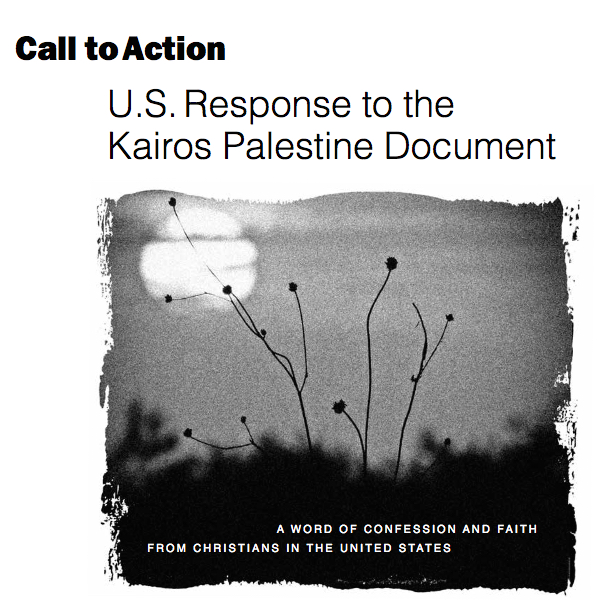 Kairos USA “Call to Action” Study Guide and Curriculum
Kairos USA “Call to Action” Study Guide and Curriculum
The core mission of Kairos USA is to involve churches and local, regional and national organizations in study that leads to praxis. “Call to Action document is a key component in this mission.” To help groups more closely examine the document’s themes, the 6-session study guide is available in formats that can be scaled to the needs of your church or organization. See and download it at the Kairos USA website
» BACK TO TOP «
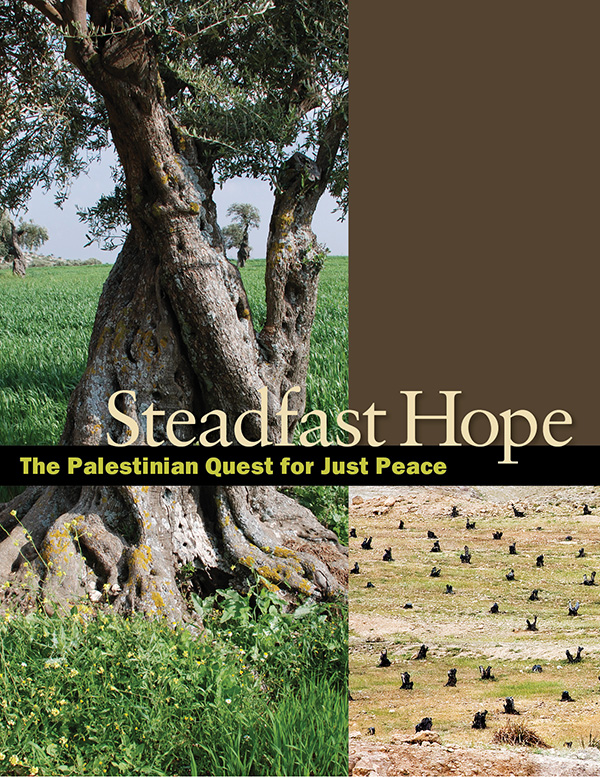 Steadfast Hope: The Palestinian Quest for Just Peace
Steadfast Hope: The Palestinian Quest for Just Peace
Produced by the Israel/Palestine Mission Network (IPMN) of the Presbyterian Church (U.S.A.), Steadfast Hope presents a compelling snapshot of the current situation on the ground, highlighting the tragic human costs of war and occupation. The booklet also offers an inspiring view of cooperation among Muslim, Jewish, and Christian peacemakers working for justice and reconciliation. This 48-page, richly illustrated booklet includes a study guide for weekly lesson plans. See it at the website of IPMN
There are accompanying video episodes for the study guide which are available for viewing and download on the IPMN Vimeo Channel: https://vimeo.com/channels/steadfasthope
» BACK TO TOP «
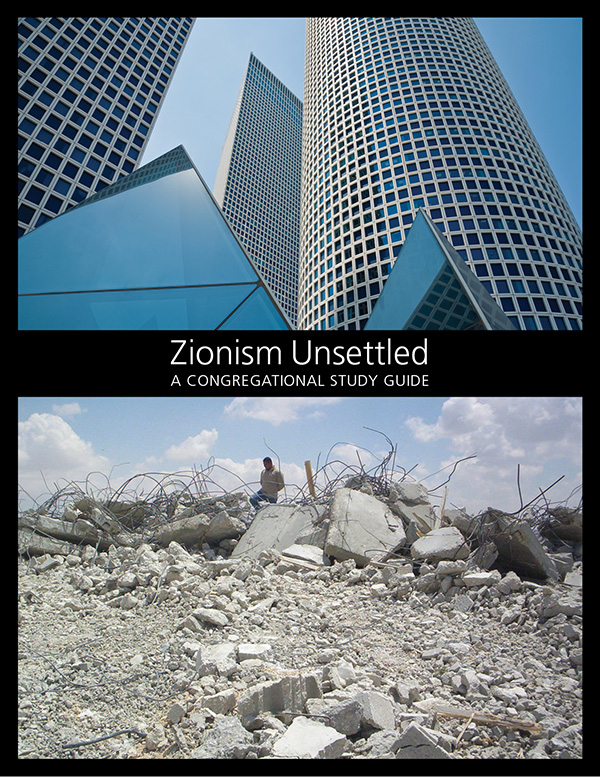 Zionism Unsettled: A Congregational Study Guide
Zionism Unsettled: A Congregational Study Guide
What role have Zionism and Christian Zionism played in shaping attitudes and driving historical developments in the Middle East and around the world? Also from IPMN of the Presbyterian Church (U.S.A.), this booklet and companion video episodes draw together compelling and diverse viewpoints from Jews, Muslims, and Christians in Israel, Palestine, the US, and around the globe. By contrasting mainstream perceptions with important alternative perspectives frequently ignored in the media, Zionism Unsettled is an invaluable guide to deeper understanding. Includes materials to order and some that can be downloaded online. See it at the website of IPMN
There are accompanying video episodes for the study guide which are available for viewing and download on the IPMN Vimeo Channel: https://vimeo.com/channels/zuepisodes
» BACK TO TOP «
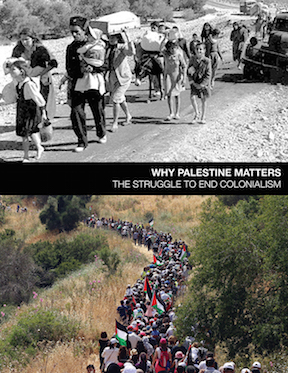 Why Palestine Matters: The Struggle to End Colonialism
Why Palestine Matters: The Struggle to End Colonialism
This 2018 publication from the Israel Palestine Mission Network (IPMN) of the Presbyterian Church USA is grounded in international law and brings Palestine into focus through the lens of intersectionality. In the words of Dr. Martin Luther King, Jr., “Injustice anywhere is a threat to justice everywhere. We are caught in an inescapable network of mutuality, tied in a single garment of destiny.” Why Palestine Matters contains abundant additional resources such as Group Guidelines, Tips for Offering a Course, video clips for every chapter and more, making the material easily accessible and usable in a wide variety of learning settings.
Learn more, order the book, and get the others resources at the Why Palestine Matters website
» BACK TO TOP «
Understanding Palestine
This online course from Makan, ‘Understanding Palestine’, has been created in cooperation with The Institute of Palestine Studies. It provides a cohesive and complete story of Palestine through the lens of history, identity, and politics. Via expert speakers and in-depth research, learn about key issues such as the Nakba, refugeehood and Israeli apartheid that affect Palestinians today.
This course is designed to be accessible and informative for beginners, but it also contains plenty of information for those with some knowledge about Palestine. No matter where you are in your journey, this is a self guided course so you can learn at your own pace. Plus, you have the opportunity to consolidate your learning with our reflection questions at the end of each unit.
Learn more
» BACK TO TOP «
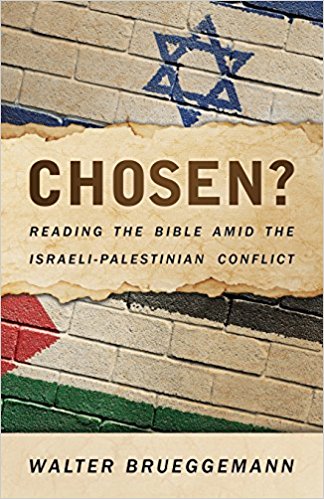 Chosen? Reading the Bible Amid the Israeli-Palestinian Conflict, by Walter Brueggemann
Chosen? Reading the Bible Amid the Israeli-Palestinian Conflict, by Walter Brueggemann
“The conflict is only ‘seemingly’ beyond solution, because all historical-political problems have solutions, if there is enough courage, honesty, and steadfastness.”
In Chosen? Walter Brueggemann explores the situation in modern-day Israel that raises questions for many Christians who are easily confused when reading biblical accounts of God’s saving actions with the Israelites. Are modern Israeli citizens the descendants of the Israelites in the Bible whom God called chosen? Was the promise of land to Moses permanent and irrevocable? What about others living in the promised land? How should we read the Bible in light of the modern situation? Who are the Zionists, and what do they say?
In four chapters, Brueggemann addresses the main questions people have with regards to what the Bible has to say about this ongoing issue. A question-and-answer section with Walter Brueggemann, a glossary of terms, study guide, and guidelines for respectful dialogue are also included. The reader will get answers to their key questions about how to understand God’s promises to the biblical people often called Israel and the conflict between Israel and Palestine today.
“This important volume could be a “game changer” for pastors, congregational study, denominational policy, the academy, religious journals, and hopefully elected officials who continue to fail the Palestinians, Israelis, and their own constituents with decades of misguided Middle East policies.” Available from Amazon, Barnes & Noble, and other retailers.
» BACK TO TOP «
How Are the Children?
Palestinian Children in Israeli Military Detention
From the Palestine Israel Network of the United Church of Christ (UCCPIN)
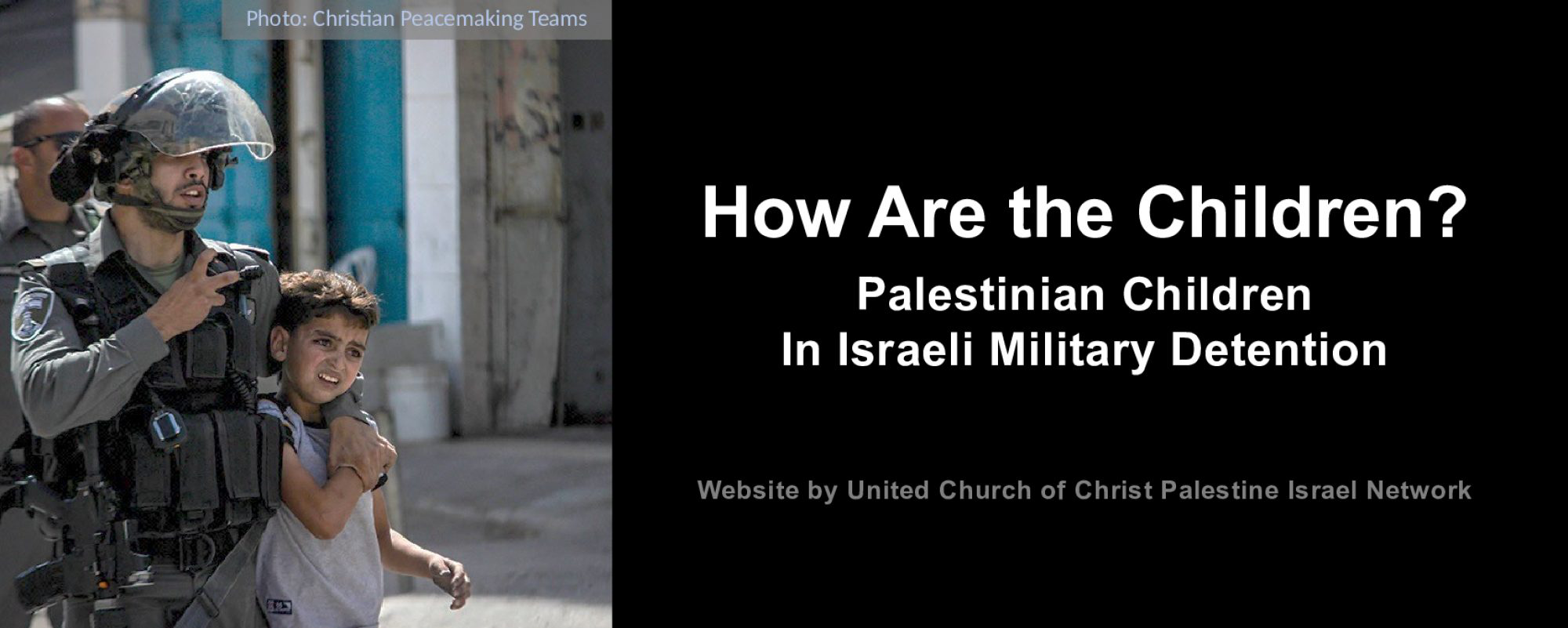 “How Are the Children?” is a video-based curriculum designed for UCC members and congregations, it can also be a valuable resource for church groups in other denominations. Discover how Israeli practices of military detention affect Palestinian children, their families and their communities. Hear UCC national leaders bear witness to the injustices they have witnesses personally. See how the UCC and other denominations offer strong leadership in highlighting and challenging these abuses.
“How Are the Children?” is a video-based curriculum designed for UCC members and congregations, it can also be a valuable resource for church groups in other denominations. Discover how Israeli practices of military detention affect Palestinian children, their families and their communities. Hear UCC national leaders bear witness to the injustices they have witnesses personally. See how the UCC and other denominations offer strong leadership in highlighting and challenging these abuses.
The Information for Presenters at the curriculum website can help anyone, regardless of expertise or experience, present this material at their church. Designed as a two-session class, each session includes opening and closing prayers and a video presentation, which are intended to be a springboard for more learning and discussion, leading to action. To that end, the website also provides recommended study guides, books, and films that will build on the issues introduced in the two video presentations. Explore the curriculum website: https://hatcnow.org/
» BACK TO TOP «
Facing the Nakba
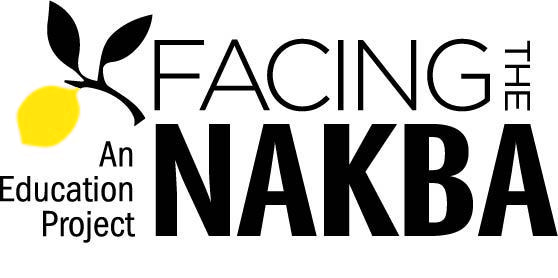 From Jewish Voice for Peace
From Jewish Voice for Peace
A 7-session curriculum that offers an opportunity to learn about what happened before and during 1948, to look at the ongoing effects of the Nakba, and to understand why and how that story is elided in U.S. conversations. This curriculum includes an in-depth guide for facilitators and recommended tracks: in synagogues [we would recommend for church groups also] or on college campuses, among organizers or high school students. Explore this curriculum
» BACK TO TOP «
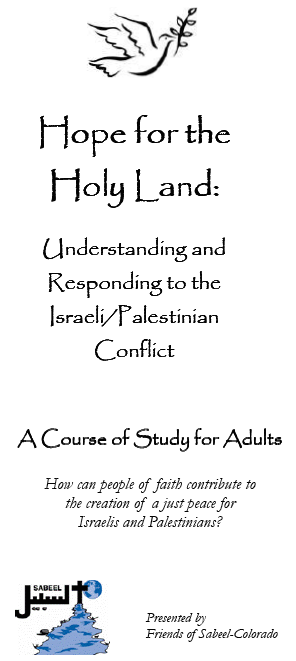 Hope for the Holy Land:
Hope for the Holy Land:
Understanding and Responding to the Israeli/Palestinian Conflict
A Course of Study for Adults
How can people of faith contribute to the creation of a just peace for Israelis and Palestinians?
From Friends of Sabeel-Colorado
Objectives of the Study: 1. To understand the background of the conflict between the Israelis and Palestinians. 2. To understand current developments in the Middle East. 3. To consider possible alternatives for resolving the conflict. 4. To become advocates of a just peace for Israelis and Palestinians.
Format of the Study: The course consists of three to five one-hour sessions, beginning with an introduction to the conflict, and ending with a discussion of ways to advocate for a just peace. Friends of Sabeel-Colorado will work with you to craft a course that best meets the needs of your group. Resource people who have first-hand experience of Israel/Palestine are available to meet with your group, to present information and slides, and to facilitate discussion. There are also several excellent videos available that your group may wish to include in the study.
Cost of the Study: Sabeel will gratefully accept donations to be used to continue their work of education and advocacy. Checks should be made out to “Friends of Sabeel.”
Possible Class Sessions: 1. Introduction to the Conflict 2. The Role of the US, the Media and the Israeli Lobby 3. Challenging Christian Zionism 4. Current Developments and Alternative Solutions 5. Advocating for a Just Peace
Download the brochure for this class
For more information, contact Joy Lapp: 303-494-2338 or email: [email protected].
» BACK TO TOP «
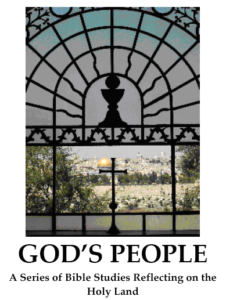 God’s People: Bible Studies Reflecting on the Holy Land
God’s People: Bible Studies Reflecting on the Holy Land
From The Methodist Church in Britain
Written by Rev. Dick Jones
11 pages
A series of four biblical studies which consider the teaching about God’s calling of a people, the light shed by Jesus, and then some reflections by the first Christians. The series helps us to respond to such questions as:
What did God promise to Abraham and his descendants? What did God require of his people? How does Jesus handle these promises, or fulfill them? Does Judaism today have a special claim upon the land of Palestine? Has the Church replaced Israel in God’s purposes? The series is designed to promote discussion and not to promote any one position. There are suggestions for further study.
This series is laid out for four group sessions but can easily be extended to six or eight meetings if the group so wishes. There is, for instance, no session designed to inform the members about the current situation and any group may like to begin with such a fact-finding time. In this case the papers produced by Christian Aid are excellent (e.g. Facts on the Ground or One Land and Many Voices) but it is helpful to use the most recent work since the situation changes rapidly.
Download this Bible Study
See both of the recommended papers by Christian Aid posted below on this page.
» BACK TO TOP «
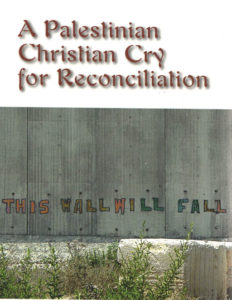 Study Guide for A Palestinian Christian Cry for Reconciliation, by Naim Ateek
Study Guide for A Palestinian Christian Cry for Reconciliation, by Naim Ateek
Study Guide by Susan Bell and Lee Porter
Offered by Friends of Sabeel North America (FOSNA)
This 12-page guide, prepared by Susan Bell and Lee Porter of Friends of Sabeel DC Metro, is useful for groups and
individuals interested in studying the book by the founder and director of Sabeel, the Rev. Naim Ateek. The book includes an introduction by Archbishop Desmond Tutu. John H. Thomas, former general minister and president of the United Church of Christ, stated that the book “is essential reading for anyone committed to the non-violent struggle for peace and justice in the Middle East.”
The guide consists of two types of questions: questions that highlight important information to focus on in each chapter and questions for discussions and written reflections, regarding issues discussed in that chapter that have stimulated readers’ thinking.
Chapters of the book/sections of the study guide:
The Birth of Sabeel; The Generous Offer of the Palestinians; The Breeding of Violence; The Bible and the Land; Jonah, the First Palestinian Liberation Theologian; The Theology and Politics of Christian Zionism; Son of David or Suffering Servant?; Saddam, Sodom, and the Cross; Samson, the First Suicide Bomber; Daniel or Judah Maccabeus; Whose Jerusalem?; Israel’s Predicament; The Two-State Solution Is Not Enough; From Justice to Forgiveness.
Download this Study Guide (12 pages)
» BACK TO TOP «
• PromisedLandMuseum.org: The Jewish Museum of the Palestinian Experience
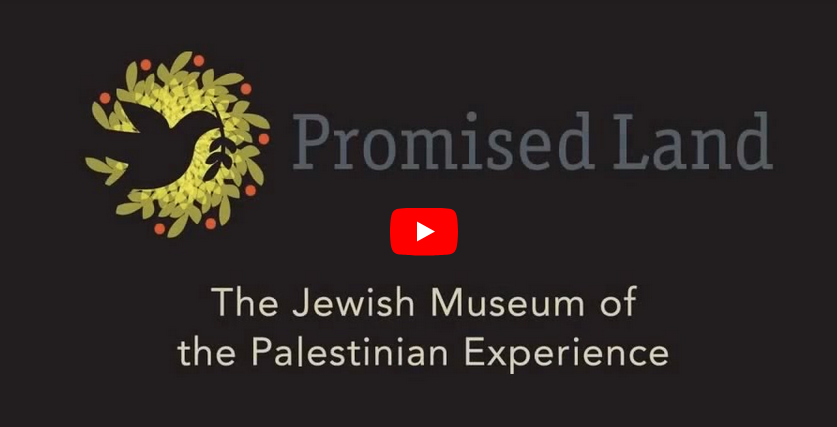 This is a digital project of the Coalition for Peace with Justice, presented in 6 easy-to-follow, engaging segments with many visual elements on a beautifully designed website. This virtual museum presents a Jewish perspective on essential Judaic values combined with information drawn largely from Jewish sources – such as JVP’s Facing the Nakba (see above on this page) – to explain the historic injustice done to the Palestinian people in the Nakba: the catastrophe for the Palestinian people of expulsion from their homeland that continues today.
This is a digital project of the Coalition for Peace with Justice, presented in 6 easy-to-follow, engaging segments with many visual elements on a beautifully designed website. This virtual museum presents a Jewish perspective on essential Judaic values combined with information drawn largely from Jewish sources – such as JVP’s Facing the Nakba (see above on this page) – to explain the historic injustice done to the Palestinian people in the Nakba: the catastrophe for the Palestinian people of expulsion from their homeland that continues today.
FOUR TIPS:
• Find the full Menu of the website by clicking the orange tab in the top left corner of the screen. (You can also use the prompts at the bottom of each page to go to the next section.)
• As you scroll down each page, click the orange tabs on the right for supplemental content in videos, photos, etc.
• Note the “Featured” Voices, Documents, etc, on the left side of the page.
• In the Menu, choose “More” for just that: great additional sources in News/Events/Resources, and the Gallery, and Get Involved.
» BACK TO TOP «
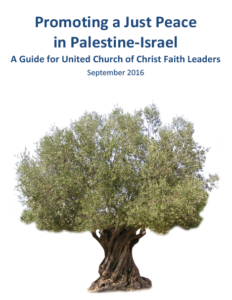 Promoting a Just Peace in Palestine-Israel:
Promoting a Just Peace in Palestine-Israel:
A Guide for United Church of Christ Faith Leaders
In the 2009 Kairos Palestine document, A Moment of Truth, Palestinian Christians called on the churches of the world to “stand alongside the oppressed” in Palestine-Israel. They asked our churches, “Are you able to help us get our freedom back?” In 2015, the 30th General Synod of the United Church of Christ adopted the resolution “A Call for the United Church of Christ to Take Actions toward a Just Peace in the Israeli-Palestinian Conflict.”
This guide, prepared by the United Christ of Christ Palestine Israel Network (UCC PIN), provides resources to equip UCC lay and ordained faith leaders to study and implement the resolution. The resolution’s goal is to contribute to ending the Israeli military occupation of the Occupied Palestinian Territories: the West Bank, East Jerusalem and Gaza. The UCC resolution does not call for a blanket divestment or boycott of Israel. Rather, it calls only for divestment from companies which are complicit in or profit from human rights violations arising from occupation of the Palestinian Territories by the state of Israel, and for boycott of products produced in illegal Israeli settlements located in the Occupied Palestinian Territories.
Guide Contents:
Introduction; I. The Current Urgent Situation; II. Biblical and Theological Grounding; III. Summary of the UCC General Synod Resolution; IV. Educational Empowerment; V. Economic Leverage; VI. Political Advocacy; VII. Interfaith Dialogue, Partnership and Action; VIII. Encountering Resistance; IX. Resources; X. Contact UCC PIN
Download this Guide (24 pages)
» BACK TO TOP «
 Facts on the Ground: The end of the two-state solution?
Facts on the Ground: The end of the two-state solution?
Published by Christian Aid, 2004
72 pages
See the supplement to this paper, One Land and Many Voices, also published by Christian Aid (see below).
Both are recommended by The Methodist Church in Britain, as supplements for the Bible Study, God’s People (see above).
Excerpts from Preface:
Christian Aid is the official relief and development agency of 40 church denominations in the UK and Ireland….
Christian Aid works in some of the world’s poorest communities in more than 50 countries. Informed by our work with 600 local organisations, our commitment to poverty eradication encompasses a commitment to human rights and justice. An essential dimension of our work is identifying the underlying causes that contribute, in part or wholly, to the impoverishment of a given community. An integral part of our core purpose is to be prophetic in challenging the structures and systems that keep people poor or marginalised. In this context, we speak out on behalf of, and with, those who are poor.
Because we have worked in the Middle East for five decades, we have been in a unique position to witness the deterioration of the social and economic status of Palestinians. Development work alone cannot improve their humanitarian situation: advocacy is also required. Without a political solution and an end to the Israeli occupation of Palestinian territory, an accountable Palestinian government, and a long-term framework within which external assistance is clearly framed, Palestinian dependency on emergency relief will grow as poverty deepens.
Contents:
Preface; Introduction; 1 Facts on the ground: the creation of settlements; 2 A tale of two cities: Ma’ale Adumim and Jerusalem; 3 The ultimate fact on the ground: the separation barrier ; 4 Trapped or transferred?; 5 The real cost of land: poverty and despair; 6 Breaking the bounds: land and international law; 7 A viable state?; 8 The donors’ dilemma; 9 A climate of impunity; 10 Prospects: an end to the two-state solution?; Recommendations: a duty to act; Glossary; Notes
Download this paper (72 pages)
» BACK TO TOP «
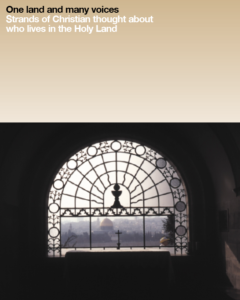 One Land and Many Voices:
One Land and Many Voices:
Strands of Christian thought about who lives in the Holy Land
Published by Christian Aid
Written by Martin Wroe
16 pages
Supplement to Facts on the Ground, also published by Christian Aid (see above).
Both are recommended by The Methodist Church in Britain, as supplements for the Bible Study, God’s People (see above).
In October 2004, Christian Aid published a report entitled Facts On The Ground: The End of aTwo–State Solution. It drew attention to injustices relating to Israel and the Occupied Palestinian Territories. This paper complements it by offering theological reflection on some of the issues. It is subtitled Strands of Christian thought about who lives in the Holy Land, in recognition of the fact that there is no single approach to this issue that unites all Christians. Deeply principled people who have read the Bible with close attention have come to different conclusions about the way passages concerning the land east of the Mediterranean and its inhabitants should be interpreted. The varying conclusions to which they have come have led them to lend support to varying political initiatives that have had a profound impact on the lives of all the people who live in the region. It is important for Christians not only to understand the theology that underpins their political conclusions, but also to try to understand why others who share the same faith and Scriptures have different views.
In the paper you will read the story of God’s dealings with the people who lived in the land east of the Mediterranean during the period covered by the Old Testament of the Christian Bible, and also some of the teaching of Jesus about the kingdom of God. Reflections on how this story has been interpreted in recent years follow. And, finally, the booklet introduces three distinctive (and perhaps irreconcilable) strands of Christian thought that are each held by large numbers of faithful people today.
Download this paper (16 pages)
» BACK TO TOP «
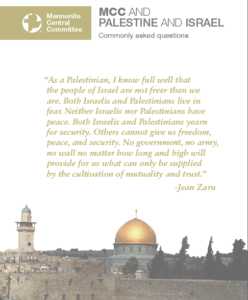 MCC and Palestine and Israel: Commonly Asked Questions
MCC and Palestine and Israel: Commonly Asked Questions
Published by the Mennonite Central Committee
15 pages
Christians, Jews and Muslims have abiding interest and investment in the land of Palestine and Israel. Mennonite Central Committee has worked in this region for more than 65 years. We are frequently asked by supporters and others about this work. This resource aims to continue those conversations by sharing some of the questions we are asked most frequently and how we respond to them. We hope this resource contributes to our ongoing engagement with all who have interest in the topics below.
Sections:
Recent History; What Does the Bible Say about Palestine and Israel? ( Did God give the land to Israel? Aren’t the people of Israel God’s chosen people? What about the claim in Genesis 12:3 that God will bless those who bless Abram’s descendants and curse those who curse them?) Palestinian Christians (Background; Is biblical Israel the same as the modern state of Israel? What is Christian Zionism? What is an Anabaptist perspective on a Jewish state? What is a Good News theology for both Jews and Palestinians?) MCC in Palestine and Israel
Download this paper (15 pages)
» BACK TO TOP «




